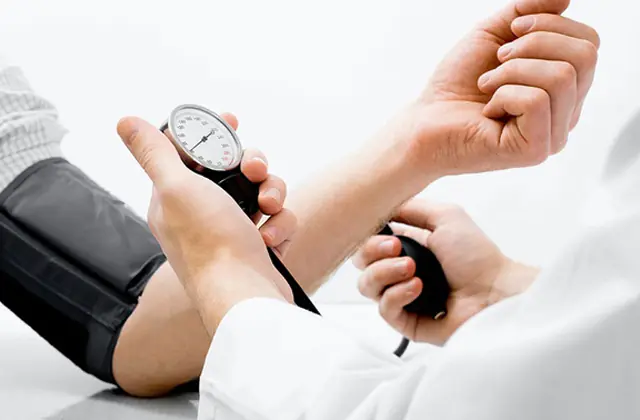
What low blood pressure readings can cause complications? Consequences of arterial hypotension for different systems and organs. Prevention of complications of hypotension.
The content of the article:- Blood pressure norms
- Consequences of hypotension
- Brain
- Visual functions
- The cardiovascular system
- During pregnancy
- Gastrointestinal tract
- Prevention of complications of hypotension
Complications of hypotension are the consequences that result from a systematic or one-time decrease in blood pressure. Depending on the type of disease, the body’s pathological reactions to disturbances differ. In particular, chronic arterial hypotension has a slow but destructive effect on the brain, cardiovascular and digestive systems, as well as on the organs of vision. An acute decrease in blood pressure if emergency assistance is not provided can cause death.
Blood pressure norms
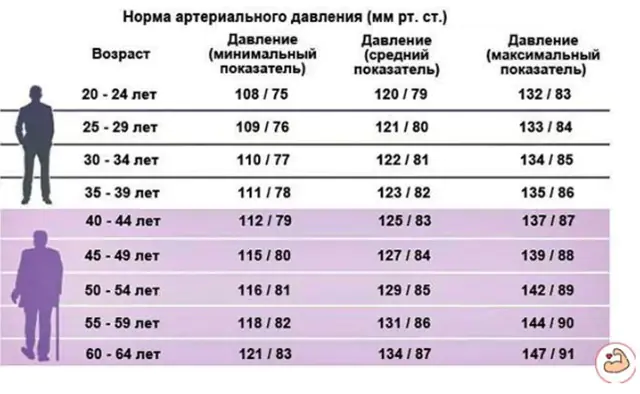
The diagnosis of arterial hypotension is preceded by a single or continuous decrease in blood pressure. Depending on how often this condition is recorded and what causes it, several types of hypotension are distinguished, namely acute and chronic. The cause of acute hypotension is blood loss, various types of physiological shock, and sudden physical exertion. Chronic hypotension is either a manifestation of vegetative-vascular disorders, or a symptom of various diseases of the cardiovascular system, brain, digestive organs, endocrine disorders and other pathologies.
There are certain blood pressure standards by age:
- In children from 3 to 9 years of age, values should not exceed 100/60 mmHg. Art.
- At the age of 10 to 20 years, blood pressure should not rise above 110/70 mmHg. Art.
- Up to 40 years of age, the normal blood pressure is up to 120/80 mmHg. Art.
- After 40 and up to 60 years, the normal blood pressure is no higher than 130/90 mm Hg. Art.
Very often, in the context of determining blood pressure standards, the concept “working pressure” is heard. These are the indicators with which a person feels comfortable and is able to perform work activities without affecting the quality of life. However, doctors are increasingly drawing patients' attention to the fact that this is a misconception. The fact that the body has adapted to a constant decrease in pressure, that is, hypotension, or, on the contrary, an increase - hypertension, has adjusted its health in such a way that a person feels comfortable, does not mean that the problem does not exist. Therefore, if you experience a persistent decrease in blood pressure levels by at least 10 mmHg, this is a reason to consult a doctor. Even if it doesn't cause physical discomfort.
The diagnosis of hypotension is established after a series of diagnostic measures. And they start with blood pressure monitoring. Ideally, not only daily, but also daily, as well as with and without load. Then the therapist (and this is the doctor who needs to start the examination) can refer you to the following medical procedures:
- Consultations of narrow specialists. A visit to a cardiologist, neurologist, or endocrinologist is almost always mandatory. If necessary, a gastroenterologist's opinion may also be needed.
- Surveys. Depending on the medical history, the doctor may prescribe echocardiography of the heart muscle, ultrasound examination of the abdominal cavity, kidneys, endocrine system, and Doppler examination of blood vessels.
After confirming the diagnosis and identifying the causes that led to the development of this pathology, doctors prescribe therapy. In the event that hypotension has developed as a result of third-party diseases of the internal organs, their treatment is prescribed, and medications are prescribed to normalize blood pressure. However, very important in the treatment and prevention of complications of hypotension are the correction of the patient’s lifestyle and the neutralization of those factors that contribute to increased symptoms of the disease.
Consequences of arterial hypotension
Since, most often, a sharp decrease in pressure is a symptom, it is important to find out the cause of this condition. Hypotension can be the result of large blood loss (including internal bleeding), a major heart attack, or even an infectious disease. It is important to remember that a sharp decrease in blood pressure can even result in death. This is due to the fact that simultaneously with a decrease in pressure in the human circulatory system, a deficiency in the supply of nutrients and oxygen to all organs begins. With prolonged fasting, tissue death can occur, and this is a direct path to the development of serious diseases of the heart muscle, brain, visual organs and other vital organs.
The danger of hypotension for the brain

A systematic, sharp decrease in blood pressure primarily leads to starvation of brain cells, which causes their destruction and death.
Why is hypotension dangerous for the brain?
- Ischemic stroke. It is a severe disruption of blood circulation in some area of the brain. The cause of the disorder is a blockage or narrowing of an artery without rupture. Low blood pressure can lead to this. The negative impact of ischemia on the brain is critical, since disruption of blood circulation in cells leads to the death of some tissues. The severity of brain damage is determined by the time of oxygen starvation and the individual characteristics of the patient.
- Alzheimer's. Due to starvation of brain cells, a number of pathological processes occur in it. Plaques form and loss of neurons and synaptic connections is caused. Such processes lead to atrophy of certain areas of the cerebral cortex. Increasingly serious problems with memory and concentration arise. The process is slow, but frighteningly destructive.
Visual impairment due to hypotension
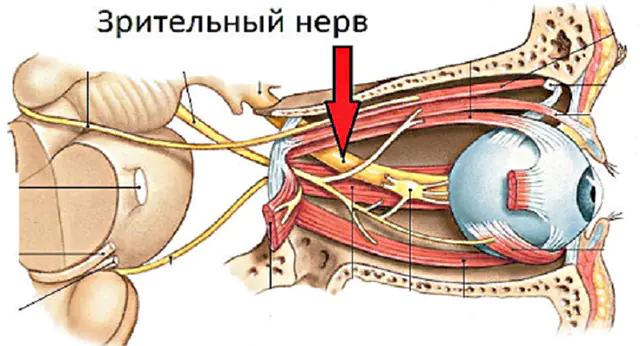
Arterial hypotension is a common companion to diseases of the optic nerve. This happens for the same reason - due to lack of oxygen and nutrients. Any organ needs adequate nutrition, which is impossible with insufficient blood pressure.
The diagnosis of “hypotension” can cause the following diseases of the visual organs:
- Optic atrophy. Not only atrophy occurs, but also the death of nerve fibers. Read also about optic neuritis. This can happen to young people, not necessarily to those who have suffered from low blood pressure for years. Even a young man who leads a completely healthy lifestyle, but has been exposed to low blood pressure for some time, may encounter the pathology of atrophy or death of the optic nerve. That is why it is important to control blood pressure levels even in apparently healthy people. Since not so long ago this disease led to complete blindness and was considered incurable.
- Retinal dystrophy. The pathology is dangerous because it does not manifest itself in the initial stages. But subsequently it leads to negative changes in visual functions, which, alas, cannot be corrected. The causes of the disease are not fully understood. It is thought that it may be a genetic disorder, but some people experience it and some do not. And scientists attribute lack of nutrition to the factors that provoke the development of this disease.
Consequences of hypotension for the cardiovascular system
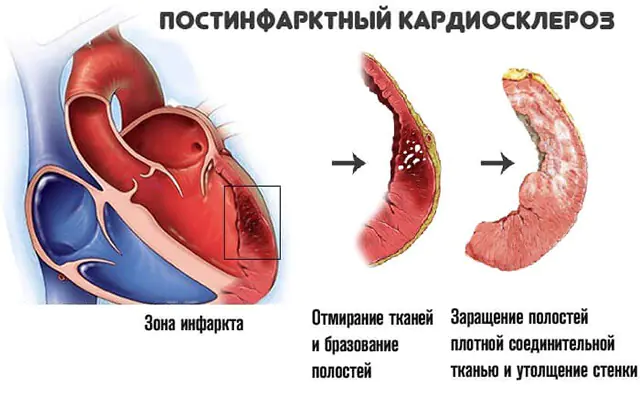
With a period of years of low blood pressure, structural changes occur in the vessels. This leads to the development of the other extreme - hypertension. It is important to know that having problems with low blood pressure in the past, surges in high blood pressure will be more difficult to tolerate than for people who initially suffer from hypertension.
Consequences of hypotension for the heart and blood vessels:
- Cardiosclerosis. Continuous oxygen starvation caused by hypotension leads to oxygen deficiency in the heart muscle. A process is initiated in which the cells that make up the heart muscle are replaced by scar tissue. It does not participate in the contractile movements of the heart, and, as a result, the load on the main muscle increases. The patient does not feel any discomfort for a long time, but he develops heart failure. This manifests itself in poor tolerance to physical activity, shortness of breath, swelling, arrhythmia and tachycardia.
- Heart attack. This is necrosis of heart tissue caused by a lack of blood supply. Against the background of hypotension, severe pressing pain in the chest, a feeling of lack of air, and a feeling of heaviness in the chest should cause extreme concern.
- Arrhythmia. Heart rhythm disturbances occur when the electrical impulses that initiate heart contractions do not function correctly or do not reach the recipient, causing the heart to beat excessively fast or, conversely, slower than it should. When diagnosed with hypotension, arrhythmia is caused by the formation of scar tissue that prevents the passage of electrical impulses.
What are the dangers of hypotension during pregnancy?
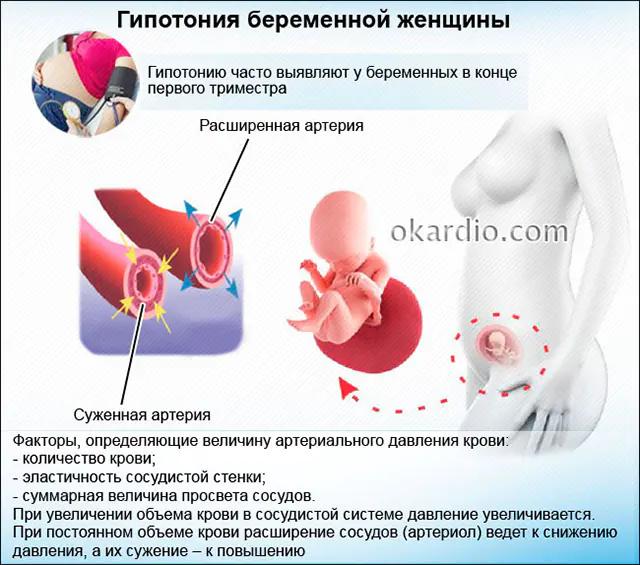
The tendency to hypotension can increase significantly during pregnancy, when a woman’s body is more susceptible than usual to the harmful influence of any factors that provoke pathology. At this time, the load on all systems and organs is so great that they lose the ability to self-correct. In these conditions, medical care is extremely necessary, since the consequences of hypotension for both mother and baby can be very sad.
Complications of arterial hypotension in pregnant women:
- Fainting. Quite often observed in pregnant women. The reason for this condition is a decrease in heart rate as a result of insufficient blood pressure on the walls of blood vessels when leaving the heart muscle (systolic pressure) and its subsequent slowdown even more as it flows through the arteries (diastolic pressure).
- Placental insufficiency. The placenta is a connecting link between mother and child, and low blood pressure in a pregnant woman can cause failure of the organ that performs the nutritional, respiratory, excretory, protective and other functions of the fetus. Placental insufficiency can cause fetal death, that is, lead to the death of the baby.
- Developmental defects. Slow blood supply causes hypoxia, which has an extremely negative effect on the fetus. In addition, there may be a lack of substances for the full formation and development of the baby’s organs. Subsequently, this can lead to developmental defects of the child, both mental and physical.
Consequences of hypotension for the gastrointestinal tract

Prolonged arterial hypotension can lead to the development of diseases of the digestive system - so-called postprandial hypotension. Expressed in a decrease in blood pressure after eating. Mostly occurs in old age and has the same symptoms as normal hypotension, but only develops after eating.
This is a fairly serious disease, as it impairs the motility of the stomach and intestines, slows down the release of enzymes and food processing, and also disrupts the act of natural bowel movement. It is diagnosed by measuring blood pressure in patients before and after meals.
Prevention of complications of hypotension

To prevent the development of complications due to hypotension, it is extremely important to engage in prevention. There are two ways of preventive work. The first is to prevent the development of the disease, the second, if a pathology already exists, it is imperative to treat it.
How to prevent complications of hypotension:
- Normalize the functioning of the nervous system. This can be achieved by following several recommendations. First, it is necessary to normalize sleep. Healthy sleep is a prerequisite for the normal functioning of the nervous system. People of working age should sleep at least 8 hours a day, and children and the elderly - 10 hours. For babies and older people, sleep can be divided into several stages - daytime and nighttime. Even if you can’t fall asleep at first, you just need to lie down and rest, gradually you will get used to the regime, and you will be able to increase your sleep time. The second important point is the fight against stress. They deplete the nervous system and develop into depression, apathy, and neuroses. Therefore, it is extremely important to be able to manage yourself and not overreact to any external stimuli. If you can’t cope on your own, seek help from a doctor.
- Take care of nutrition. Since people with insufficient body weight are often susceptible to hypotension, there is an opinion that nutrition for arterial hypotension should be aimed at increasing muscle mass. This is partly true, but food should not be empty. That is, it should not be only bread, pasta and sweets, it should be a complete food, rich in microelements and vitamins. In the off-season, it is recommended to strengthen your diet with special vitamin complexes, which balance the amount of substances necessary for the full functioning of the body.
- Move more actively. A sedentary, and even more so a recumbent, lifestyle does not contribute to the normalization of blood pressure. It is very important to be physically active, as movement and exercise speed up blood flow, thereby increasing blood pressure. Make it a rule to get off one stop earlier on the way home, walk in the evenings, and do exercises in the morning. Regular exercise is also essential - at least twice a week. Swimming is especially beneficial for men, and water aerobics for women.
- Tone your blood vessels. This can be achieved using several techniques. Firstly, there are food groups whose intake is aimed at increasing blood pressure. You should not abuse such food, but this technique can be used periodically. First of all, these are salted and smoked dishes, caffeine-containing products, high-calorie foods, offal, starch and alcohol. Also, a contrast shower and wearing compression garments will help tone the blood vessels. Water procedures will help in the prevention of colds and hemorrhoids, and wearing underwear on your arms and legs will save you from varicose veins of the upper and lower extremities.
- Get medical examinations. Regular visits to the doctor will help to suspect the disease in time, carry out the necessary diagnostic measures and prescribe therapy. But the most important thing is that timely visit to the doctor and treatment of chronic diseases, the side effect of which is hypotension, will help to avoid it as a symptom of another illness. Therefore, even if your employer does not require regular medical examinations, undergo them for yourself.
Hypotension can cause quite serious complications. They develop gradually, because of this a person does not feel a sharp deterioration in the quality of life, adapts and learns not to pay attention to the ailment. Unfortunately, this is often what causes the irreversible consequences that low blood pressure can lead to. The main danger of oxygen starvation and lack of nutrition of systems and organs caused by arterial hypotension is necrosis of the tissues of the brain, heart muscle, organs of vision and others. Therefore, it is extremely important to prevent the development of hypotension, and if it has already happened that you have been diagnosed with the disease, be sure to undergo therapy on time and in full.
Video about what hypotension is and how it is dangerous:



